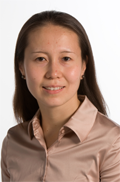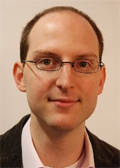NWO awards Veni grants to three ERIM members
Nailya Ordabayeva, Bram van den Bergh and Michel van der Wel were awarded Veni grants by the Dutch Organisation for Scientific Research (NWO). All will receive up to €250,000 to carry out follow-up research for three years.

The Veni grants are part of NWO's Innovational Research Incentives Scheme (IRIS), which seeks to support “outstanding individuals of exceptional talent and originality who have a great enthusiasm for the conduct of challenging, ground-breaking research.” The Veni grants in particular “are for excellent researchers who have recently obtained their doctorates and are starting out on their careers, but who have already demonstrated an outstanding talent for academic research.”
ERIM is very proud and congratulates the three recipients with this great achievement.
Nailya Ordabayeva
 Why supersized packages seem smaller
Why supersized packages seem smaller
<link people nailya-ordabayeva _blank>Nailya Ordabayeva is an Assistant Professor in Marketing Management at the Rotterdam School of Management, Erasmus University. Her research project focuses on consumer perceptions of supersized product packages and food portions. “We don’t realize just how large these packages really are,” explains Ordabayeva. This tendency to underestimate the size of big packages is an important driver behind overconsumption and obesity. To come to an understanding of this “underestimation bias” among consumers, she will conduct a series of experiments in the coming years. Her eventual findings will have practical implications. Ordabayeva: “[they] will suggest policies to help consumers better monitor their consumption quantity and quality, which in effect will inform policies for fighting overconsumption and obesity.”
Bram van den Bergh
 The persistence of placebo effects
The persistence of placebo effects
In his research, <link people bram-van-den-bergh _blank>Bram van den Bergh, who is also a marketing scientist at RSM, will focus on the placebo effects of marketing actions. Van den Bergh: “Research on placebo effects is scarce, because placebos cannot be ‘patented’ or commercialized. Placebos are often cast as the villains to beat in medical research, although the placebo effect is a phenomenon that could guide us toward a better understanding of health/behavioural improvements.” In particular, Van den Bergh will investigate to what extent placebo effects are enduring rather than transient phenomena. Do experiences with placebos attenuate or amplify subsequent placebo effects? His findings will contribute to theoretical debates in marketing, psychology and medicine, while also yielding practical insights for policy makers, marketing practitioners, drug developers and citizens.
Michel van der Wel
Measuring the risk of government bonds
 Government bonds often serve as a safe haven for investors. “It’s striking that, in the face of the uncertainty partially caused by the US downgrade, investors turn to American bonds for security,” comments <link people michel-van-der-wel _blank>Michel van der Wel, an Assistant Professor at the Erasmus School of Economics. Still, recent developments in European bond markets have demonstrated that investments in government bonds are not free of risk. Since Van der Wel wrote his grant proposal in late 2010, this topic has only become more relevant. “In general, when you purchase a ten-year treasury bond and you keep it for exactly ten years, your investment will be risk-free. However, if you sell it, as often happens, or need to retain the investment for a longer period of time, as is the case for pension funds, you run a risk. That’s the focus of my research.” Van der Wel will develop methods to improve the measurement of that risk, by using richer data than was used so far: “I will use intraday data of financial markets, and study the link with the macro-economy.” He will concentrate on the US, which is still considered a save haven in terms of investment in government bonds.
Government bonds often serve as a safe haven for investors. “It’s striking that, in the face of the uncertainty partially caused by the US downgrade, investors turn to American bonds for security,” comments <link people michel-van-der-wel _blank>Michel van der Wel, an Assistant Professor at the Erasmus School of Economics. Still, recent developments in European bond markets have demonstrated that investments in government bonds are not free of risk. Since Van der Wel wrote his grant proposal in late 2010, this topic has only become more relevant. “In general, when you purchase a ten-year treasury bond and you keep it for exactly ten years, your investment will be risk-free. However, if you sell it, as often happens, or need to retain the investment for a longer period of time, as is the case for pension funds, you run a risk. That’s the focus of my research.” Van der Wel will develop methods to improve the measurement of that risk, by using richer data than was used so far: “I will use intraday data of financial markets, and study the link with the macro-economy.” He will concentrate on the US, which is still considered a save haven in terms of investment in government bonds.


